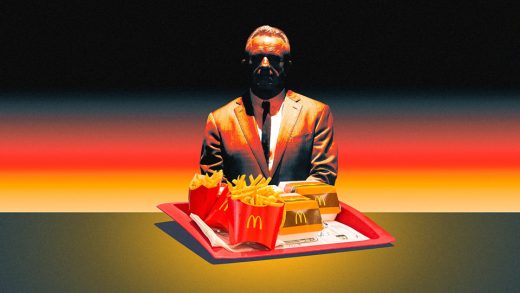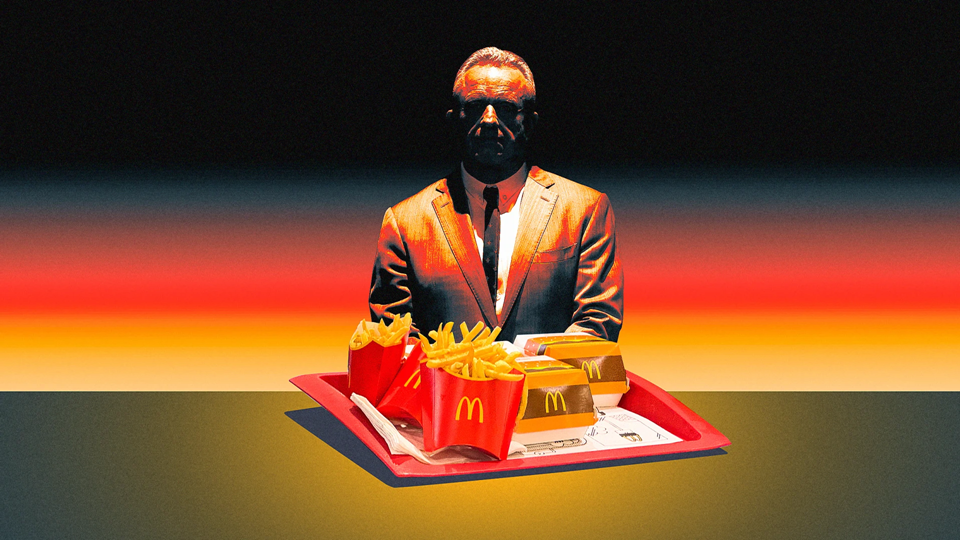Donald Trump sends a message—in a Big Mac Combo Meal
Donald Trump sends a message—in a Big Mac Combo Meal
Donald Trump’s photoshoot with RFK Jr. made a statement about McDonald’s, even as it rolls out half-gallon jugs of McRib Sauce.
BY Rob Walker
Branded is a weekly column devoted to the intersection of marketing, business, design, and culture.
The widely shared photograph of Donald Trump, his eldest son, and Elon Musk sharing a McDonald’s repast with an unenthusiastic Robert Kennedy Jr. in Trump’s private plane was an instant meme, fodder for late-night punch lines, and the inspiration for at least one viral hoax. (For the record: The picture was not anticipated by an 18th century painting from made-up artist “Deitz Nuützen.”)
But between the lulz, there actually seems to be a message in the tableaux. If there are contradictions or conflicts in the stated policy goals of Trump and his top advisers—including Kennedy, his choice for head of Health and Human Services—there’s no question who makes the decisions.
Make America Healthy Again starts TOMORROW. ???????????? pic.twitter.com/LLzr5S9ugf
— Donald Trump Jr. (@DonaldJTrumpJr) November 17, 2024
In this case, there’s a disconnect between Kennedy’s scorn for processed foods and Trump’s weakness for fast food—not just as a matter of personal taste but as a symbolic connection to the masses. (Kennedy literally referred to the grub selection on Trump’s plane—“KFC or Big Macs”—as “poison” just days before he was pictured with his Combo Meal.) So, partly the message was a clarification that Kennedy’s ambitious agenda (also targeting vaccines and pharmaceutical regulation) may have limits.
The heavy-handed who’s-the-boss symbolism is what made the incident a buzzy topic. “I love that they essentially hazed RFK Jr., who rails against processed food and has called fast food poison, by not only making him eat McDonald’s but forcing him to take a picture while doing it,” Seth Meyers joked. “Only Donald Trump would force his new health czar to eat McDonald’s,” Jimmy Kimmel added. “That’s what he does, these are subservience tests.”
But beyond alpha-male gustatory posturing, there are real questions about how some of Kennedy’s Make America Healthy Again (er, MAHA) ideas fit with the broader Trump agenda. While the second round of MAGA looks to repeat the pro-business vibe of the first, news of the Kennedy pick caused a number of big food stocks to wobble on fears of new scrutiny for soft drinks, snacks, and packaged goods. For example, shares in Lamb Weston, one of the world’s largest producers of frozen potato products—which supplies fries to McDonald’s, among others—fell more than 6%.
But Kennedy’s call to beef up the rules around pesticides, additives, and (one of his debatable bugaboos) seed oils doesn’t really pair well with Trumpworld’s stated distaste for government regulation. Lobbyists and trade groups representing packaged-food sellers, agribusiness, and other links in the mass-food chain stepped up their activity even before Trump announced he would tap Kennedy, concerned about added costs and potential pushback from consumers. And broadly speaking, the food industry has had a good relationship with prior Republican administrations. (The first Trump administration pared back restrictions on pesticides and other regulations.)
During the campaign, Donald Trump suggested he would let Kennedy “go wild” on health issues, a pledge as vast as it was vague. Kennedy’s sweeping ambition includes dubious and dangerous ideas about vaccines and other subjects that could undermine his confirmation, let alone his actual agenda. As it happens, one of his puzzling ideas, demonizing seed oils (canola, sunflower) as causing disease, puts McDonald’s directly in his crosshairs—and is just the sort of overreach that “could give the industry the ammunition it needs to derail him,” according to a New York Times report on the mass-food sector’s response to Kennedy’s ambitions. This week, packaged-food giant Nestlé’s CEO downplayed concerns at an investor event: “It’s still early,” he told Reuters. “What was campaign rhetoric and what will move to policy?”
As for McDonald’s—where Trump famously appeared to dole out fries as a campaign stunt—the bipartisan favorite doesn’t appear to be scrambling to introduce kale or otherwise concerned about the popularity of its fast-food classics: It just announced the latest return of its infamously boneless-but-rib-shaped McRib sandwich and introduced half-gallon jugs of Whole Lotta McRib Sauce.
It’s always the case that the conflicting alliances of convenience that can make a winning campaign possible can’t always withstand the reality of governing. While some of Kennedy’s ideas seem popular with Trump voters, it’s less clear how consumers would react to the news that regulators are coming for their Froot Loops—let alone their fries. So, jokey as it was, that junk-food meal sent a message not just to Kennedy and the processed food makers, but to Trump’s supporters: What will really end up on the health-reform menu is a work in progress. And that’s a reality Kennedy will just have to stomach.
(7)



